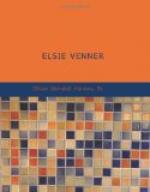“Why, no,” said the old Doctor, “I haven’t got a great many printed books; and what I have I don’t read quite as often as I might, I’m afraid. I read and studied in the time of it, when I was in the midst of the young men who were all at work with their books; but it’s a mighty hard matter, when you go off alone into the country, to keep up with all that’s going on in the Societies and the Colleges. I’ll tell you, though, Mr. Langdon, when a man that’s once started right lives among sick folks for five-and-thirty years, as I’ve done, if he has n’t got a library of five-and-thirty volumes bound up in his head at the end of that time, he’d better stop driving round and sell his horse and sulky. I know the bigger part of the families within a dozen miles’ ride. I know the families that have a way of living through everything, and I know the other set that have the trick of dying without any kind of reason for it. I know the years when the fevers and dysenteries are in earnest, and when they’re only making believe. I know the folks that think they’re dying as soon as they’re sick, and the folks that never find out they ’re sick till they’re dead. I don’t want to undervalue your science, Mr. Langdon. There are things I never learned, because they came in after my day, and I am very glad to send my patients to those that do know them, when I am at fault; but I know these people about here, fathers and mothers, and children and grandchildren, so as all the science in the world can’t know them, without it takes time about it, and sees them grow up and grow old, and how the wear and tear of life comes to them. You can’t tell a horse by driving him once, Mr. Langdon, nor a patient by talking half an hour with him.”
“Do you know much about the Veneer family?” said Mr. Bernard, in a natural way enough, the Doctor’s talk having suggested the question.
The Doctor lifted his head with his accustomed movement, so as to command the young man through his spectacles.
“I know all the families of this place and its neighborhood,” he answered.
“We have the young lady studying with us at the Institute,” said Mr. Bernard.
“I know it,” the Doctor answered. “Is she a good scholar?”
All this time the Doctor’s eyes were fixed steadily on Mr. Bernard, looking through the glasses.
“She is a good scholar enough, but I don’t know what to make of her. Sometimes I think she is a little out of her head. Her father, I believe, is sensible enough;—what sort of a woman was her mother, Doctor?—I suppose, of course, you remember all about her?”
“Yes, I knew her mother. She was a very lovely young woman.”—The Doctor put his hand to his forehead and drew a long breath.—“What is there you notice out of the way about Elsie Venner?”
“A good many things,” the master answered. “She shuns all the other girls. She is getting a strange influence over my fellow-teacher, a young lady,—you know Miss Helen Darley, perhaps? I am afraid this girl will kill her. I never saw or heard of anything like it, in prose at least;—do you remember much of Coleridge’s Poems, Doctor?”




